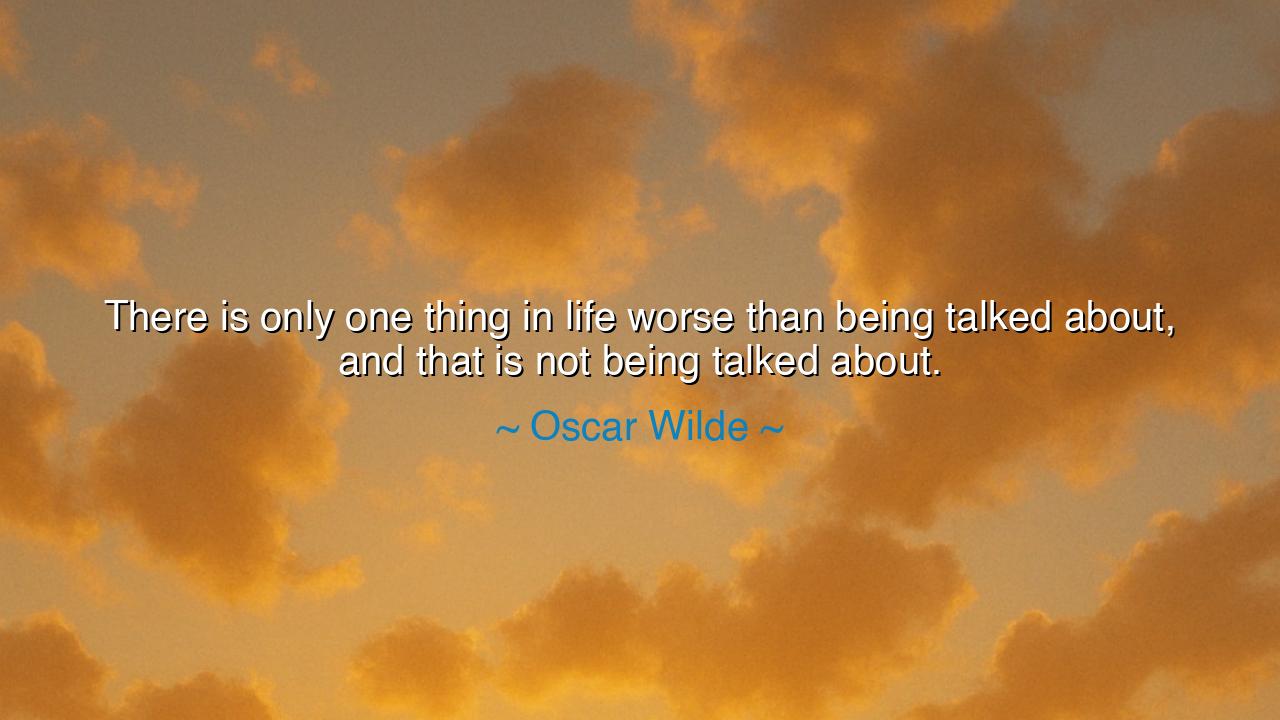
There is only one thing in life worse than being talked about
There is only one thing in life worse than being talked about, and that is not being talked about.






In the grand theater of life, where human beings play their parts on the stage of history, there is one thing more desired than fame or respect, and that is attention. The great wit of Oscar Wilde captures this paradox with a statement that resonates across time: “There is only one thing in life worse than being talked about, and that is not being talked about.” This remark holds within it a deep understanding of human nature—a nature that craves recognition and validation, even at the cost of reputation. Wilde speaks not just of vanity, but of the very human need to be seen, to be acknowledged in a world where obscurity can feel like the greatest of punishments.
In the ancient world, fame was not merely a byproduct of one's deeds but the manifestation of one's existence. The Greeks, for example, placed a high value on legacy, on being remembered for one's contributions, whether in philosophy, warfare, or art. The Achilles of the Iliad sought not only victory but eternal glory. Even in his death, he desired that his name would echo through the generations. The desire to be talked about, to leave a mark on the world, is not a new one. It is the heartbeat of human ambition—the eternal struggle to not only exist but to be remembered, to have one's story live on. In this context, Wilde's words serve as a reflection of the human condition: that the worst fate is not being maligned or misunderstood, but being utterly forgotten.
Consider the story of Julius Caesar, the mighty Roman general and emperor. Though he faced criticism, conspiracy, and even betrayal, he never lacked attention. His name, whether praised or scorned, was always on the lips of the people. Caesar’s legacy endures, not just because of his military conquests, but because he understood the power of being talked about—the power of visibility. In fact, his assassination, though tragic, only solidified his place in history, ensuring that for millennia, scholars, poets, and historians would speak of him. He became a symbol of both ambition and tyranny, and in this paradoxical light, his name has remained, a testament to the truth in Wilde’s observation that being talked about is a form of immortality, even if it is born of controversy.
Yet, it is not just historical figures who crave this attention; it is a force that shapes the lives of ordinary people as well. The desire to be seen and acknowledged is a force that drives so many of our actions, from the smallest gestures to the most monumental achievements. Social media, in the modern age, has amplified this need. People, often without fully understanding it, seek validation through likes, comments, and shares, constantly searching for recognition, even in fleeting forms. Wilde’s insight into the dangers of obscurity—the terror of not being talked about—has found new expression in the digital age, where the absence of attention can feel like a kind of erasure.
At the same time, Wilde’s quote touches on a universal truth: that the fear of obscurity is greater than the fear of criticism. Think of the great artists who, for centuries, toiled in anonymity, only to gain fame posthumously. Vincent van Gogh is a prime example. During his lifetime, van Gogh was largely ignored, misunderstood, and even ridiculed for his unconventional style. He was talked about only in the harshest terms. Yet today, he is regarded as one of the greatest artists of all time. His fame, though tragic, shows that for many, being talked about, even negatively, is a form of recognition and ultimately, immortality. Wilde understands that criticism is less painful than being completely overlooked—it means that you matter, that your existence is still felt in the world, even if that existence is misunderstood.
The lesson we can take from Wilde’s words is not to seek fame for fame’s sake, but to understand the role of recognition in our lives. We must ask ourselves: What is it that we truly seek from being talked about? Is it validation of our worth, or is it simply the desire to be seen, to have our humanity acknowledged? True fulfillment does not lie in the shallow pursuit of attention, but in the pursuit of meaningful work that resonates with others—whether in art, relationships, or service to the greater good. When we create something worth talking about, we connect to the world in a way that transcends temporary praise or criticism.
In practical terms, Wilde’s insight calls us to reflect on how we live in relation to public opinion. Success and validation do not come from mere approval but from the impact we have on others. Whether in business, art, or personal growth, we must focus not on how much we are talked about, but on the depth of the legacy we leave. Instead of seeking constant recognition, we should aim to make meaningful contributions that resonate with those around us. It is not the quantity of attention that defines our value, but the quality of our impact.
Ultimately, Oscar Wilde’s words remind us that to truly live is to be seen, but to be truly fulfilled is to create something worth being seen. Let us strive to make our lives a reflection of this truth: not to be consumed by the need for constant attention, but to work toward leaving a legacy that speaks for itself, one that is talked about for the depth of its impact rather than the fleeting nature of its popularity.






AAdministratorAdministrator
Welcome, honored guests. Please leave a comment, we will respond soon